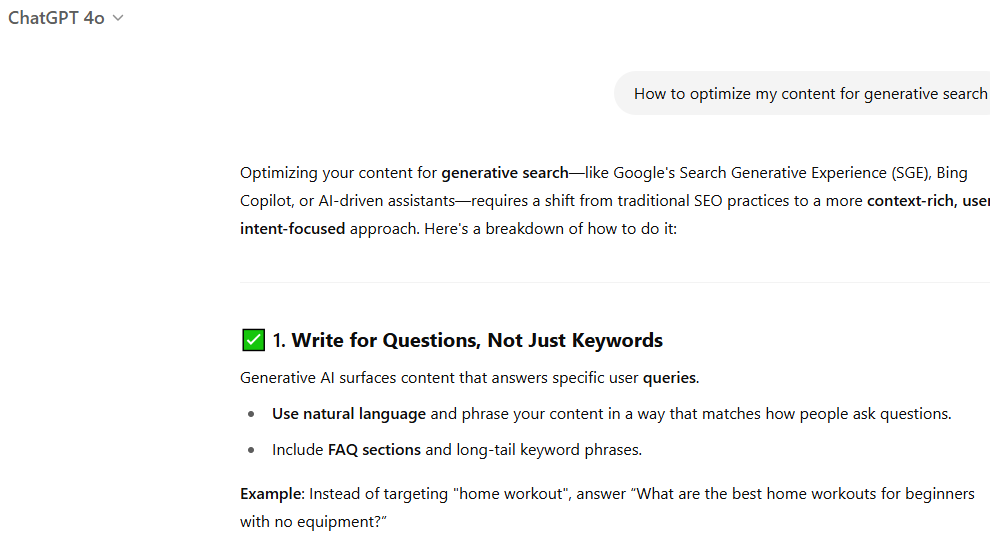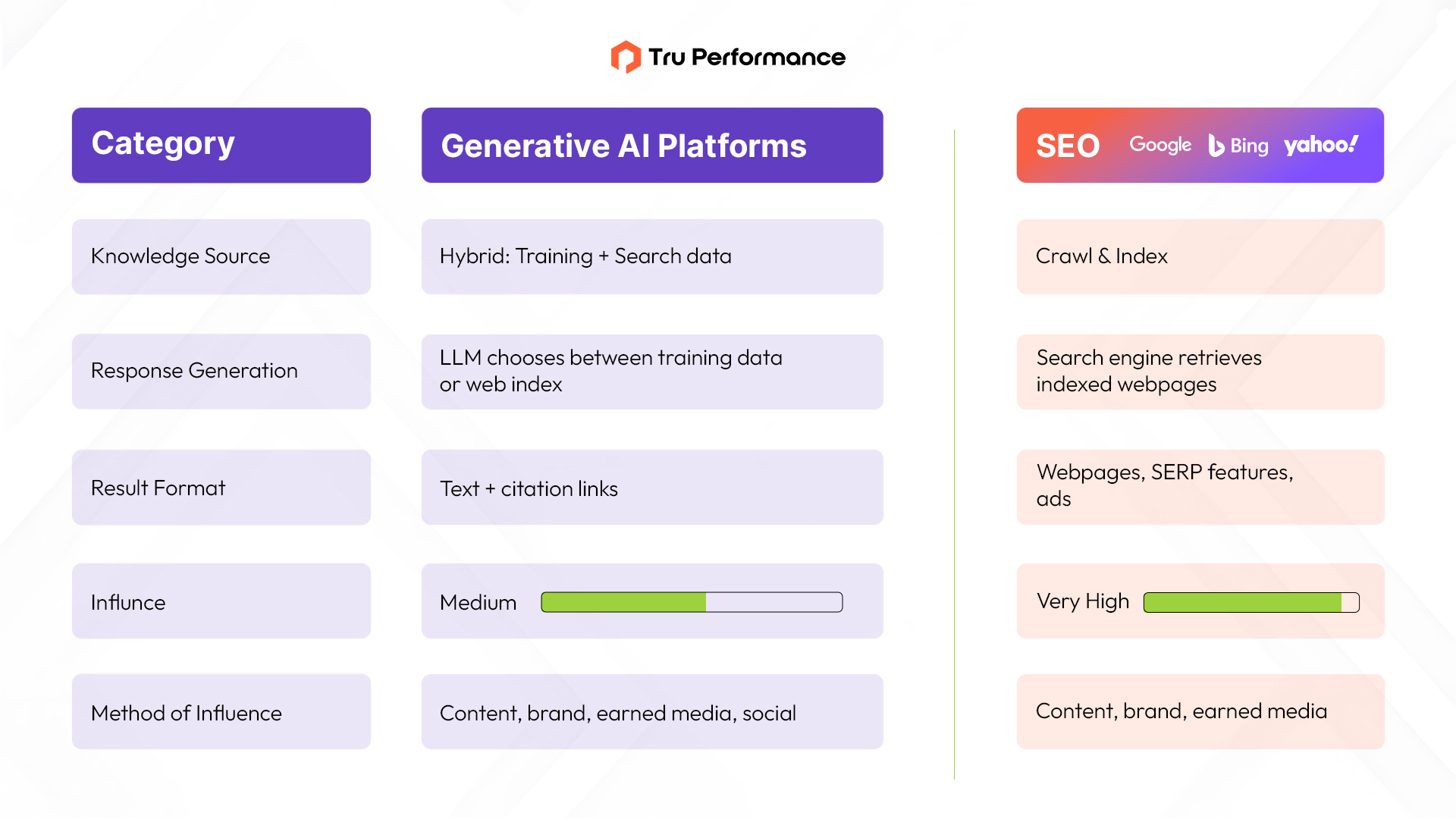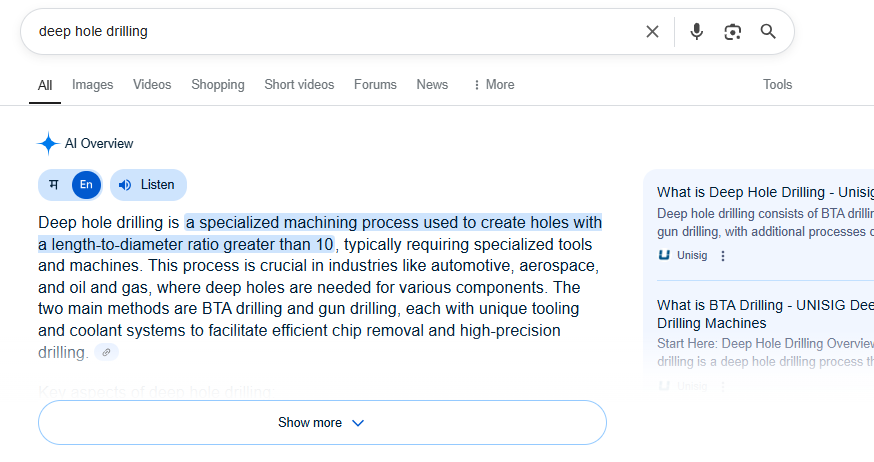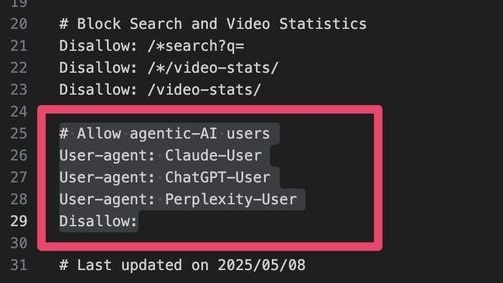Generative search has drastically changed the way people search on the internet. Instead of scrolling through a list of links, users are increasingly turning to AI-powered tools to get direct, conversational answers. This shift is driven by advanced AI models powering new search experiences. To stay visible in this changing landscape, businesses and content creators must adapt their strategy through Generative Engine Optimization (GEO). Mastering GEO now will position you for success as generative AI transforms the future of search.
Generative Engine Optimization (GEO) is the practice of optimizing your content so that it’s prominently featured in responses from AI-driven search engines and assistants. In simple terms, GEO ensures that when someone asks a generative AI platform (like ChatGPT, Google’s Bard, or Bing’s AI chat) a question related to your industry or expertise, the AI is more likely to include information from your content in its answer.

Generative search engines don’t work like traditional search engines that return a list of websites. Instead, they use AI models to generate an answer on the fly, pulling context and facts from the sources they’ve learned from or can access.
GEO means tailoring your website and content for this AI-driven approach. That involves creating content that not only serves human readers but is also easy for AI to interpret and trust. In essence, you’re helping the AI understand the value of your content so it can incorporate your brand’s insights when answering user questions.

Back Then

Results Now

Importantly, as Forbes has noted, zero-click searches are on the rise, with over a quarter of desktop searches in the U.S. ending without any click at all—a number expected to grow as AI continues to dominate the SERP landscape.
Why invest in GEO? Here are a few key benefits of incorporating generative engine optimization into your strategy:
Implementing GEO effectively requires some new tactics alongside familiar SEO practices. Here are strategies to help you master GEO:
The field of Generative search is new and rapidly evolving, which raises one concern amongst many SEOs on what can be done to support their client website for the cause. You will be able to find multiple articles online which might give you a hint but not the right actionable that you can implement to get going with the initial steps. Below mentioned are a few crucial ways by which you can start optimizing too:
By explicitly naming your “agentic-AI” crawlers (e.g. Claude-User, ChatGPT-User, Perplexity-User) and then giving them their own “Disallow:” group with no paths blocked, you get a number of advantages:

Without that dedicated allow-all group, those AI bots would fall back on the top-level User-agent: * rules and inherit your parameter-blocking and section Disallows. By opening a separate group, you ensure they see everything you want them to index (no accidental misses).
You can treat traditional search engines and specialized AI agents differently. For example, you might let Googlebot crawl certain paginated archives that you’d prefer AI agents skip, or vice versa.
By blocking query strings, embeds, PDFs, stats pages, etc., for your general crawler pool, you avoid wasting bandwidth on low-value URLs. At the same time, you can still let your trusted AI agents freely harvest the core content they’re optimized to summarize.
AI-driven services often fetch and preprocess content directly from the HTML. Keeping them on canonical, parameter-free URLs means fewer edge-cases (duplicate content, missing context, infinite filters) and more reliable summaries or embeddings.
You can cordon off legally sensitive sections (reprint permissions, private embeds) from most crawlers, yet still permit only your vetted AI partners to access them if that’s part of your licensing.
As more “ChatGPT-style” or “Claude-style” services spring up, you can simply add their UA strings to your robots.txt allow-list, rather than overhaul your global rules.

GEO brings new challenges that marketers need to navigate:
Generative AI is quickly becoming a staple of how people search. As this technology matures, GEO will likely become an essential part of SEO, not a standalone effort. Search engines are already blending AI-generated answers into their results, and this trend will only accelerate.
Forbes recently reported that over 88% of AI search snapshots appear for broad, informational queries, which historically drove high traffic to content publishers. Without GEO, that visibility risks disappearing.
In short, optimizing for generative engines is becoming the new normal in search strategy. Brands that adapt to GEO now will maintain and grow their visibility as the landscape shifts. By embracing GEO, you’re positioning your brand at the forefront of the future of search — ensuring that no matter how many questions are asked, your answers can be found.
Everything you need to know about the Generative Engine Optimization (GEO).
Generative Engine Optimization (GEO) is a new approach to digital strategy that focuses on optimizing content for visibility and performance in AI-driven search engines, referred to as generative engines (GEs). Unlike traditional search engines that primarily provide a list of links, GEs use generative AI to create comprehensive, multimodal responses to user queries, synthesizing information from various sources. GEO aims to ensure your content is prioritized and included in these AI-generated responses.
Traditional search engines display a list of relevant websites based on algorithms that consider factors like keywords, backlinks, and site structure. Generative Engines, on the other hand, leverage AI to understand the user’s intent and generate a synthesized answer that can include text, images, or videos, going beyond just providing links. They offer insights and a more conversational search experience.
While GEO builds upon traditional SEO, its focus is distinctly different. Traditional SEO aims to achieve higher rankings in a list of search results, primarily emphasizing text-based content and backlinks. GEO, however, focuses on ensuring your content is chosen by generative engines as the best possible answer to a user’s query, requiring adaptable, multimodal content and prioritizing context, clarity, and a conversational tone over strict keyword density.
Key strategies for GEO involve creating content that AI models can easily understand, prioritize, and utilize in their generated responses. This includes speaking the language of AI by using natural language and question-based keywords, thinking beyond text by incorporating visual and audio content, prioritizing relevance and authority over sheer content volume, and ensuring technical SEO aspects like structured data, site speed, and accessibility are addressed.
Generative engines are becoming increasingly influential in how users find information. Adopting a comprehensive GEO strategy is important because it offers ultimate visibility by directly placing your content as the answer in GE responses, provides multichannel impact by reaching audiences across various content formats, future-proofs your digital strategy as AI technology advances, and increases your brand’s authority by being featured as a trusted source in GE-generated answers.
Large Language Models (LLMs) like ChatGPT and Gemini are examples of generative engines that synthesize information conversationally. Optimizing content for these platforms involves tailoring it to be persuasive, authoritative, and rich in relevant keywords and statistics, which are factors that influence their recommendations. Brand mentions and relevancy play a pivotal role in getting these AI tools to recommend your products or services.
Effective GEO strategies involve several techniques to make content more appealing to generative engines. These include integrating relevant keywords naturally, citing reliable sources and adding statistics to enhance credibility, incorporating quotations from experts, making content easy to understand, optimizing for fluency and clear language, using unique vocabulary, including technical terms when appropriate, and developing authoritative content that establishes your brand as a trusted source.
Implementing GEO can present challenges such as the complexity of understanding AI-driven search engines and how they prioritize information, the need to balance AI-driven efficiency with human creativity to maintain uniqueness, and ethical considerations regarding transparency and ensuring AI-generated content genuinely serves user needs. Overcoming these challenges requires investing in expertise, finding the right balance between AI and human input, and prioritizing ethical practices.


Can’t find the answer you’re looking for? Let’s collaborate and unlock your Tru potential.
Share this blog